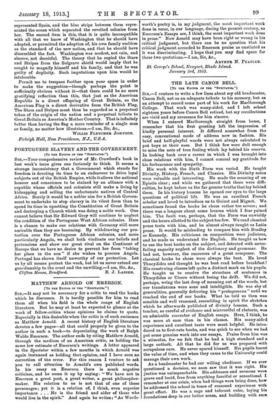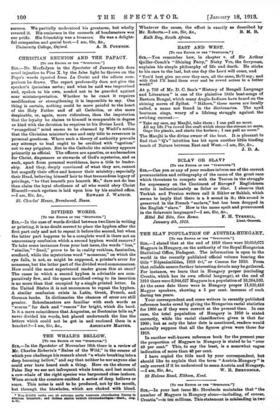THE LATE CANON BELL. [TO THE Eorros o rius "SrEcrArort."1
SIR,—I venture to write a few lines about my old headmaster, Canon Bell, not as an adequate tribute to his memory, but as an attempt to record some part of his work for Marlborough College. That work was many-sided, and I left school eighteen years before Canon Bell retired, but my recollections are vivid and my reverence for him sincere.
When I entered Marlborough straight from home, I
remember that his first greeting left the impression of kindly personal interest. It differed somewhat from the easy, conventional mode of address now in fashion. His brief and half-playful words were not always calculated to put boys at their ease. But I think few were dull enough to miss the note of true feeling which lay behind his reserve. In looking back over a career in which I was brought into close relations with him, I cannot conceal my gratitude for his forbearance and sympathy.
His work with the Sixth Form was varied. He taught
Divinity, History, French, and Classics. His Divinity notes were valuable and interesting. He made the meaning of an Epistle clear ; and while we gathered that there were difficulties, he kept before us the far greater truths that lay behind them. In his history lessons he opened our eyes to the large questions of political life. He was an excellent French scholar and loved to introduce us to Guizot and Mignet. We sometimes found the books he chose rather too severe; and there was a languor about some lessons which I fear pained him. The fault was, perhaps, that the Form was unwieldy and the hours allotted to the subject too few. We read classical prose texts with him, and he almost always taught us Latin prose. It would be misleading to compare him with Bradley or Kennedy. His criticisms on composition were judicious, and he made us understand the English. He taught us how to use the best books on the subject, and detected with neverfailing sagacity neglect of the dictionary and grammar. He had not, however, the resources of a great composer. The classical books he chose were always the best. He loved Thucydides and thought he was best read before breakfast! His construing classes left quite a distinct mark on his pupils. He taught us to resolve the structure of sentences in Thucydides or Cicero without losing the drift. We did not, perhaps, wring the last drop of meaning out of the words, but our translations were sane and intelligible. He was shy of generalities, generally deferring his "prolegomena" until we reached the end of our books. What he told us then was sensible and well reasoned, resembling in spirit the sketches which he afterwards published of divinity lessons. Such a teacher, so careful of evidence and mistrustful of rhetoric, was an admirable corrector of English essays. Here, I think, he was more at ease than in his classes. His many-sided experience and excellent taste were most helpful. He introduced us to first-rate books, and was quick to see when we bad put some genuine work into our essays. Praise from him was a stimulus, for we felt that he had a high standard and a large outlook. All that he did for us was prepared with scrupulous care. He never spared himself. His pupils learnt the value of time, and when they came to the University could manage their own work. As a headmaster he bad our willing obedience. If we ever questioned a decision, we soon saw that it was right. His justice was unimpeachable. His addresses and sermons were grave and lucid, free from anything fanciful or sensational. I remember at one crisis, when bad things were being done, how he addressed the school in tones of reasoned experience with great effect. He was a sage and tolerant ruler, laying his foundations deep in our better sense, and building with sure
success. We partially understood his greatness, but wholly revered it. His eminence in the counsels of headmasters was our pride. His friendship was a treasure: He was a delightful companion and genial host —I ane Sir, &c., University College, Oxford. A. B. POYNTON.







































 Previous page
Previous page